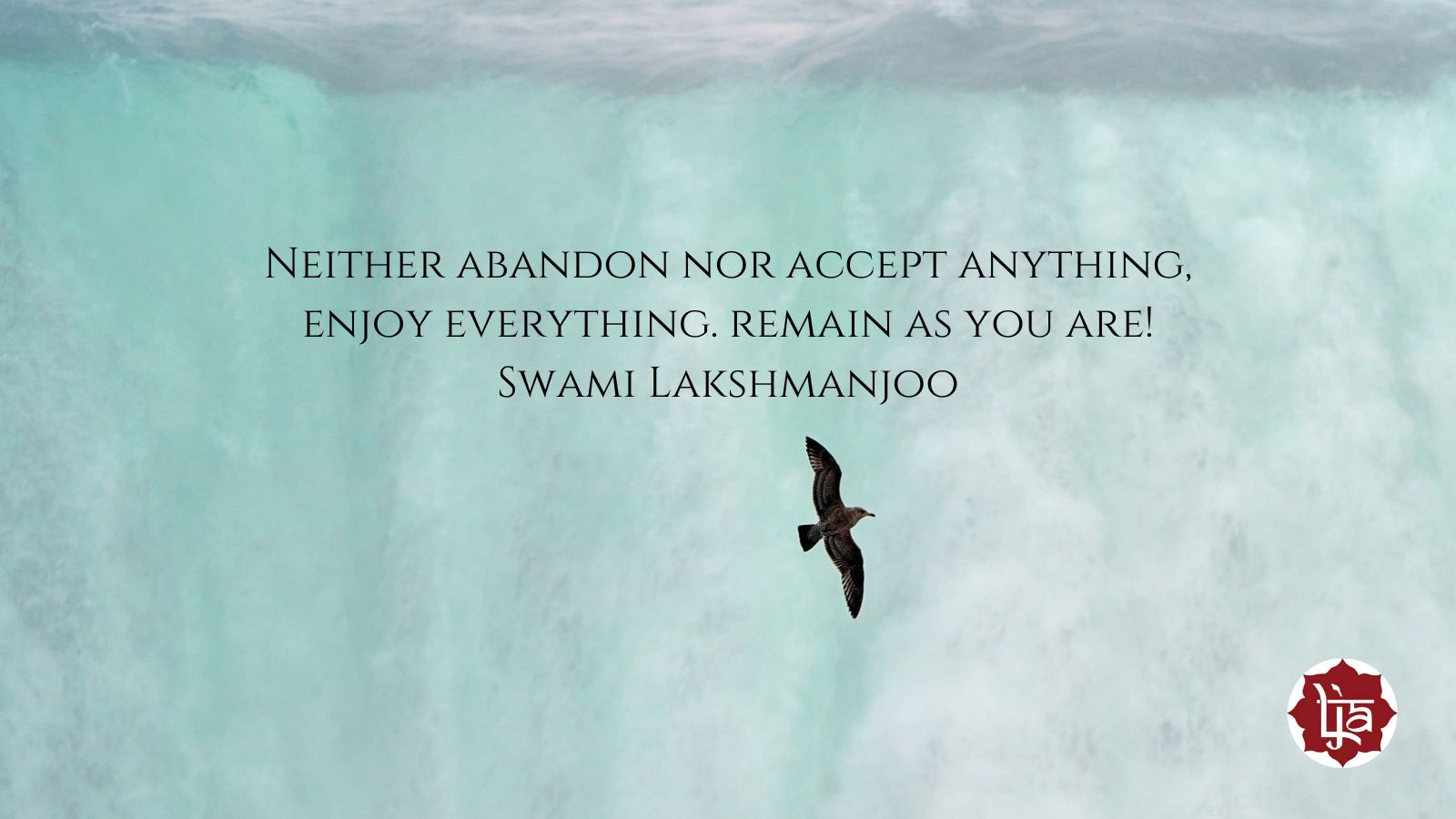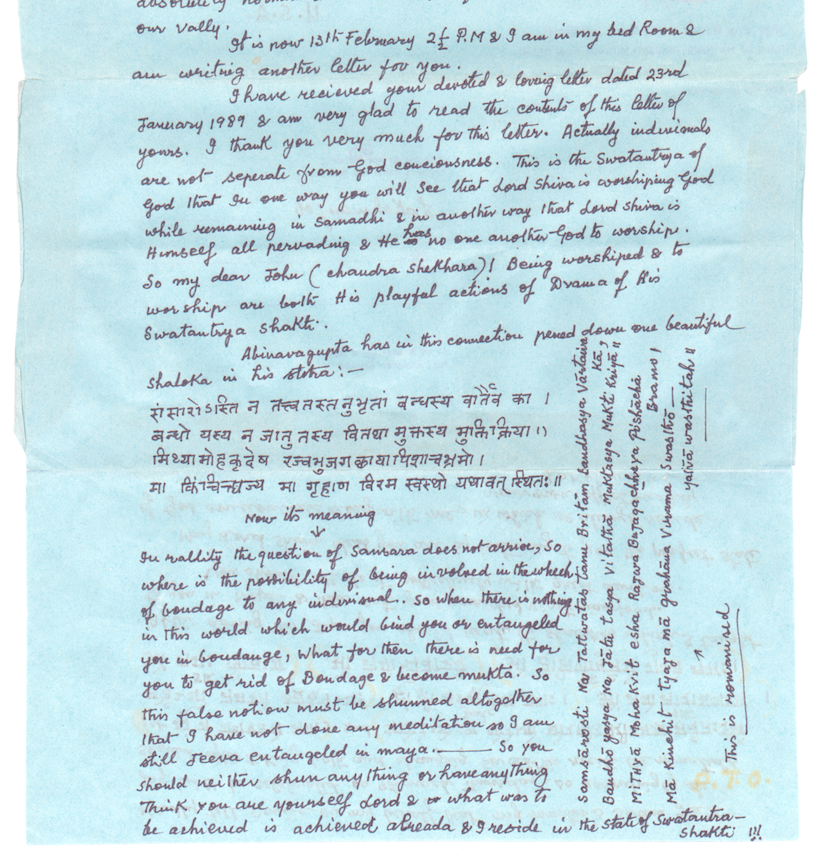Anuttarāṣṭikā by Abhinavagupta
The Anuttarāṣṭikā is a hymn of eight (aṣṭikā) verses by Abhinavagupta, on the method of anupāya (no method) in the light of the highest reality–anuttara.
The Teachings on anupāya, as elaborated in this hymn, have been revered by Kashmir Shaiva Pandits since their inception by the illustrious Shaiva Master Abhinavagupta, who devoted the second chapter of his magnum opus – Tantrāloka – to the method (upāya) known as anupāya, which literally means ‘no method’.
As far as the present writer is aware, the earliest mention of the Anuttarāṣṭikā to the English speaking world was when it appeared as the first hymn in Appendix C – Philosophical Stotras of Abhinava, in KC Pandey’s encyclopedic book: Abhinavagupta – An Historical and Philosophical Study (Chowkhamba Sanskrit Series, Vol 1. 1935).
The first English translation that we are aware of is that of Lilian Silburn, a French scholar, who studied the Anuttarāṣṭikā from the great Shaiva master Swami Lakshmanjoo as early as 1948. Silburn studied the text in English, and later published the same in French in her book Hymnes de Abhinavagupta, (Paris 1970).
During his lifetime Swami Lakshmanjoo translated this hymn into the Kashmiri language on a number of occasions. One such occasion was at the Shaiva Institute Hall in Gupta Ganga during the 1970s. Upon completion of that talk, Swamiji told one of his lifelong devotees, Shri Pranath Kaul, that this was the only stotra (hymn) that one needed to study.
The following English translation is a compilation of Lilian Silburn’s original English notes and Shri Pranath Kaul’s clear recollection of Swamiji’s translation.
Anuttarāṣṭikā
saṁkrāmotra na bhāvanā na ca kathā – yuktir na carcā na ca
dhyānaṁ vā na ca dhāraṇā na ca japā – bhyāsa prayāso na ca /
tatkiṁ nāma suniścitaṁ vada paraṁ satyaṁ ca tacchruyatāṁ
na tyāgī na parigrahī bhaja sukhaṁ sarvaṁ yathāvasthitaḥ // 1
In this highest state of supreme God consciousness (anuttara) there is no need of spiritual progress, no contemplation, no art of expression, no investigation, no meditation, no concentration, no recitation, exertion or practice.
Tell me then, what is the supreme and well-ascertained truth?
Listen indeed to this!
Neither abandon nor accept anything, enjoy everything. Remain as you are!

saṁsāro ‘sti na tattvatas tanubhritāṁ bandhasya vārtaiva kā
bandho yasya na jātu tasya vitathā muktasya mukti-kriyā /
mithyā-moha kṛideṣa rajju bhujaga – cchāyā piśāca bhramo
mā kiṁcittyaja mā gṛihāṇa vilasa svastho yathā-vasthitaḥ // 2
In reality, there is no such thing as birth and death, so how can the question arise of bondage for living beings?
There never was any such bondage for the one who is entirely free, and therefore, to struggle for liberation is useless and nothing more than delusion–like a dark shadow mistaken for a demon, or a rope seen as a snake. It is all based on deceitful perception which has no substance.
Neither abandon nor accept anything, remain as you are, well established in your own Self.
pūjāpūjaka pūjya bhedasaraṇiḥ keyaṁ kathānuttare
saṁkrāmaḥ kila kasya kena vidadhe ko vā praveśa kramaḥ /
māyeyaṁ na cid-advayāt paratayā bhinnāpyaho vartate
sarvaṁ svānubhava svabhāva vimalaṁ cintāṁ vṛithā mā kṛithāḥ // 3
In the oneness of that supreme state of anuttara what talk can there be, and what differentiated path of adorer, adored and adoration? To whom and by what means could a progression function; or what could constitute the succession of penetrating into the Self?
Wonder of wonders!
Though it appears differentiated this illusion is no other than consciousness–one without a second. Everything is nothing but the pure essence of your own Self-experience, so why worry in vain?
ānando ‘tra na vittam adyamadavan – naivāṅ ganāsaṅgavat
dīpārkendu kṛita prabhā prakaravan naiva prakaśodayaḥ /
harṣaḥ saṁbhṛita bheda mukti sukhabhūr – bhārāvatāropamaḥ
sarvā dvaita padasya vismṛita nidheḥ prāptiḥ prakāśodayaḥ // 4
One cannot compare the bliss of this state to the intoxication of wealth or wine, nor to the union with a beloved woman. And the brilliant flow of light is unlike the collection of rays from a lamp, the sun or the moon. This excessive joy of the Self is comparable only to the weight of that blissful state which descends when one gets liberated from all differentiation. The flow of this supreme consciousness is the state of universal oneness, which is nothing other than your own treasure abode that you had temporarily forgotten.
rāga dveśa sukhā sukho dayalayā – haṅkaradainyādayo
ye bhāvāḥ pravibhānti viśva vapuṣo bhinna svabhāvā na te /
vyaktiṁ paśyasi yasya yasya sahasā tattat-tadekātmatā-
saṁvid rūpam avekṣya kiṁ na ramase tadbhāvanā-nirbharaḥ // 5
Attraction and repulsion, pleasure and pain, rising and setting, self-confidence and depression; all these states with which the universe is formed, shine as mutually different but in reality, they are not.
(To show that differentiation is not really differentiated the author says). Whenever you perceive the specificity of some thing, at that very moment you should perceive the essence of your own consciousness as one with it . . . why not take delight in the fullness of that awareness?
pūrvābhāva bhavakriyā hi sahasā bhāvāḥ sadā ‘sminbhave
madhyākāra vikāra saṅkara-vatāṁ teṣāṁ kutaḥ satyatā /
niḥsatye capale prapañca nicaye svapna bhrame peśale
śaṅkātaṅka kalaṅka yukti kalanā – tītaḥ prabuddho bhava // 6
In this world the totality of objects appear eternally in the present moment, i.e. the activity of universality has no previous or future existence. Differentiated action is an illusion based on the unlawful pervasion of an intermediate state which is unreal, transient, fraudulent, just a heap of appearances like the illusion of a dream.
Remain above these defects which have been wrongfully forged by the stigma of doubts, hence be awakened!
bhāvānāṁ na samudbhavo ‘sti sahajas – tvad bhāvitā bhāntyamī
niḥsatyā api-satyatām-anubhava – bhrāntyā bhajanti kṣaṇam /
tvatsaṅkalpaja eṣa viśva mahimā nāstyasya janmānyataḥ
tasmāt-tvaṁ vibhavena bhāsi bhuvane – ṣvekopy-anekātmakaḥ // 7
For the insentient there is no outflow of objective things, for those are manifested only when experienced by thee. Though deprived of reality they share reality in one instant through one’s erroneous perception. Thus the greatness of this universe arises from your own imagination–it does not take birth from anything else. Therefore you alone shine in all these worlds, and though one, you become many by your own glory!
yatsatyaṁ yad asatyamalpa-bahulaṁ nityaṁ na nityaṁ ca yat
yan māyām-alinaṁ yadātma-vimalaṁ citdarpaṇe rājate /
tatsarvaṁ sva-vimarśa-saṁvidudayād rūpa-prakāśātmakaṁ
jñātvā svānubhavā dhirūḍha-mahimā viśveśvaratvaṁ bhaja // 8
Real or unreal, small or plentiful, eternal or momentary, what is colored by the illusion of differentiation and what is pure in one’s own Self, in reality, this universe rising from your own consciousness and becoming one with your essence appears glorified in the mirror of Consciousness.
Having ascertained the sublimity of the universe and having understood the greatness of establishing ones own Self-experience, enjoy universal sovereignty.
Eight ślokas concerning the essence of anuttara, relating to the un- practicable state of anupāya composed by the great master, Abhinavagupta.
Source: Translation of the above verses taken from the notes of Lilian Silburn.
_______________________________________________________________
In a letter to John Hughes (from the Lakshmanjoo Academy Archives), dated 13th February 1989, Swamiji wrote the following.

Actually, individuals are not separate from God consciousness. This is the svātantrya of God that, in one way you will see that Lord Śhiva is worshiping God while remaining in samādhi, and in another way that Lord Śhiva is Himself all-pervading and he has no one, i.e. another God to worship. So my dear John, being worshiped and to worship are both His playful actions of the Drama of his Svātantrya shakti.
Abhinavagupta has in this connection penned down one beautiful śloka in his stotra (Anuttarāṣṭikā).
[Swamiji wrote the second śloka from above in Devanagri and roman, and gave the following meaning.]
“In reality the question of samsāra (repeated births and deaths) does not arise, so where is the possibility of being involved in the wheel of bondage to any individual?
So, when there is nothing in this world which would bind you or entangle you in bondage, what for then is there need for you to get rid of Bondage and become jivan mukta (liberated)?
So this false notion must be shunned altogether, “That I have not done any meditation so I am still jeeva entangled in māyā (illusion). So you should neither shun anything, or have (accept) anything. Think you are yourself Lord, and what was to be achieved is achieved already; and reside in the state of svātantrya śakti!!!”

14 comments for “Anuttarāṣṭikā”